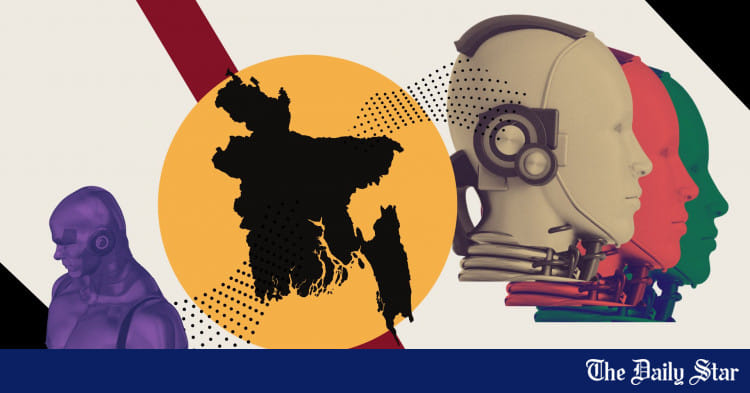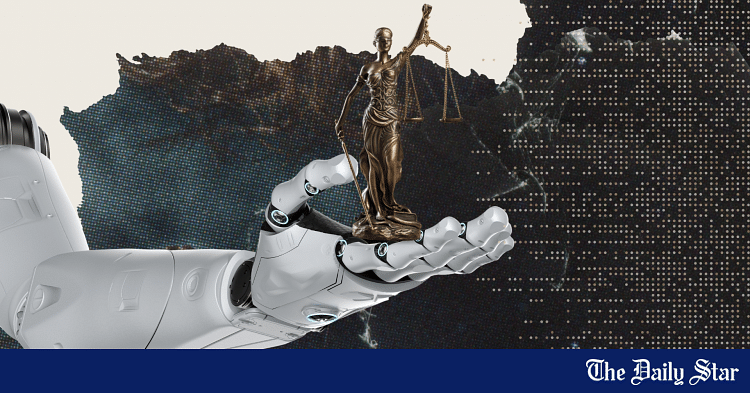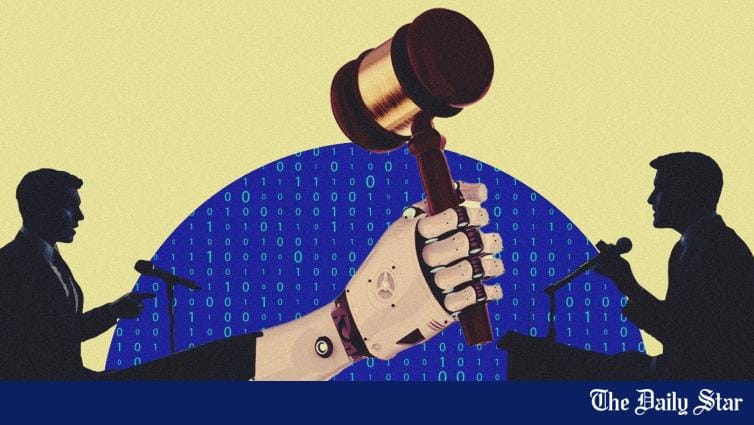Saif
Senior Member
- Joined
- Jan 24, 2024
- Messages
- 16,790
- Likes
- 8,152
- Nation

- Residence

- Axis Group

Govt drafts AI policy to tap its potential, tackle concerns

The government has formulated the draft National AI policy as it looks to make the best use of artificial intelligence to raise productivity and spur economic growth while dealing with the concerns presented by the technology spreading at a breakneck pace.
"This policy seeks to harness the benefits of AI while mitigating its risks, fostering innovation, and ensuring that AI technologies serve the best interests of the citizens and the nation as a whole," the draft said.
The Information and Communication Technology Division prepared the National AI Policy and published it recently.
The policy is expected to address the legal, ethical, and societal implications of AI effectively and efficiently.
It has placed a significant emphasis on public awareness and education, enlightening citizens about AI and its far-reaching benefits.
The objectives of the policy are to accelerate equitable economic growth and productivity through AI-driven optimisation, forecasting, and data-driven decision-making, and ensure efficiency and accessibility of public services through AI-enabled personalisation.
The draft comes as countries around the world race to prepare to deal with the changes being brought about by the fast-evolving technology.
The International Monetary Fund (IMF) has published its new AI Preparedness Index Dashboard for 174 economies, based on their readiness in four areas: digital infrastructure, human capital and labour market policies, innovation and economic integration, and regulation.
It showed Bangladesh's score stands at 0.38 compared to 0.49 of India, 0.37 of Pakistan, 0.35 of Nepal, 0.44 of Sri Lanka, 0.77 of the US, 0.64 of China, and 0.73 of Australia. Developed countries have a score of at least 0.7.
In Bangladesh, the government plans to adopt data-driven policy-making in every sector through AI-supported analytics and insights and nurture a skilled workforce that can utilise and build AI technologies.
It wants to embed AI in education and skills development so that the largely young population can meet the demands of the future.
The draft said the country will also foster a culture of AI research and innovation through public and private funding. It will ensure development and adhere to a robust ethical framework by establishing regulatory measures that uphold human rights in AI development and deployment.
The ICT Division, in collaboration with relevant ministries, industry, academia, and civil society, will take necessary steps to establish the institutional framework for the policy implementation, officials said.
It will set up an independent National Artificial Intelligence Center of Excellence (NAICE).
The NAICE will be responsible for coordination and monitoring of AI initiatives using key performance indicators and evaluation of AI initiatives' social, economic, and environmental impacts, guiding adjustments for maximum benefits and risk mitigation.
It will facilitate collaboration and knowledge-sharing among stakeholders, including government agencies, industry, academia, and civil society. It will ensure that any measures taken to regulate the technology are proportional to the risk and balanced to encourage innovation.
The government will form a high-level national AI advisory council to guide the implementation of sectoral AI initiatives.
The draft said the legal and regulatory frameworks are necessary for AI policy implementation.
The National Strategy for AI will be framed, and it will be updated every two years in accordance with the advancement of AI worldwide.
The strategy will include data retention policies, deal with the legal issues of data governance and ownership and focus on interoperability and data exchange.
According to IMF's economist Giovanni Melina, AI can increase productivity, boost economic growth, and lift incomes. However, it could also wipe out millions of jobs and widen inequality.
IMF's research has shown how AI is poised to reshape the global economy. It could endanger 33 percent of jobs in advanced economies, 24 percent in emerging economies, and 18 percent in low-income countries.
But, on the brighter side, it also brings enormous potential to enhance the productivity of existing jobs for which AI can be a complementary tool and to create new jobs and even new industries.
Melina said most emerging market economies and low-income countries have smaller shares of high-skilled jobs than advanced economies, and so will likely be less affected and face fewer immediate disruptions from AI.
"At the same time, many of these countries lack the infrastructure or skilled workforces needed to harness AI's benefits, which could worsen inequality among nations."
The economist said the policy priority for emerging markets and developing economies should be to lay a strong foundation by investing in digital infrastructure and digital training for workers.
The government has formulated the draft National AI policy as it looks to make the best use of artificial intelligence to raise productivity and spur economic growth while dealing with the concerns presented by the technology spreading at a breakneck pace.
"This policy seeks to harness the benefits of AI while mitigating its risks, fostering innovation, and ensuring that AI technologies serve the best interests of the citizens and the nation as a whole," the draft said.
The Information and Communication Technology Division prepared the National AI Policy and published it recently.
The policy is expected to address the legal, ethical, and societal implications of AI effectively and efficiently.
It has placed a significant emphasis on public awareness and education, enlightening citizens about AI and its far-reaching benefits.
The objectives of the policy are to accelerate equitable economic growth and productivity through AI-driven optimisation, forecasting, and data-driven decision-making, and ensure efficiency and accessibility of public services through AI-enabled personalisation.
The draft comes as countries around the world race to prepare to deal with the changes being brought about by the fast-evolving technology.
The International Monetary Fund (IMF) has published its new AI Preparedness Index Dashboard for 174 economies, based on their readiness in four areas: digital infrastructure, human capital and labour market policies, innovation and economic integration, and regulation.
It showed Bangladesh's score stands at 0.38 compared to 0.49 of India, 0.37 of Pakistan, 0.35 of Nepal, 0.44 of Sri Lanka, 0.77 of the US, 0.64 of China, and 0.73 of Australia. Developed countries have a score of at least 0.7.
In Bangladesh, the government plans to adopt data-driven policy-making in every sector through AI-supported analytics and insights and nurture a skilled workforce that can utilise and build AI technologies.
It wants to embed AI in education and skills development so that the largely young population can meet the demands of the future.
The draft said the country will also foster a culture of AI research and innovation through public and private funding. It will ensure development and adhere to a robust ethical framework by establishing regulatory measures that uphold human rights in AI development and deployment.
The ICT Division, in collaboration with relevant ministries, industry, academia, and civil society, will take necessary steps to establish the institutional framework for the policy implementation, officials said.
It will set up an independent National Artificial Intelligence Center of Excellence (NAICE).
The NAICE will be responsible for coordination and monitoring of AI initiatives using key performance indicators and evaluation of AI initiatives' social, economic, and environmental impacts, guiding adjustments for maximum benefits and risk mitigation.
It will facilitate collaboration and knowledge-sharing among stakeholders, including government agencies, industry, academia, and civil society. It will ensure that any measures taken to regulate the technology are proportional to the risk and balanced to encourage innovation.
The government will form a high-level national AI advisory council to guide the implementation of sectoral AI initiatives.
The draft said the legal and regulatory frameworks are necessary for AI policy implementation.
The National Strategy for AI will be framed, and it will be updated every two years in accordance with the advancement of AI worldwide.
The strategy will include data retention policies, deal with the legal issues of data governance and ownership and focus on interoperability and data exchange.
According to IMF's economist Giovanni Melina, AI can increase productivity, boost economic growth, and lift incomes. However, it could also wipe out millions of jobs and widen inequality.
IMF's research has shown how AI is poised to reshape the global economy. It could endanger 33 percent of jobs in advanced economies, 24 percent in emerging economies, and 18 percent in low-income countries.
But, on the brighter side, it also brings enormous potential to enhance the productivity of existing jobs for which AI can be a complementary tool and to create new jobs and even new industries.
Melina said most emerging market economies and low-income countries have smaller shares of high-skilled jobs than advanced economies, and so will likely be less affected and face fewer immediate disruptions from AI.
"At the same time, many of these countries lack the infrastructure or skilled workforces needed to harness AI's benefits, which could worsen inequality among nations."
The economist said the policy priority for emerging markets and developing economies should be to lay a strong foundation by investing in digital infrastructure and digital training for workers.




